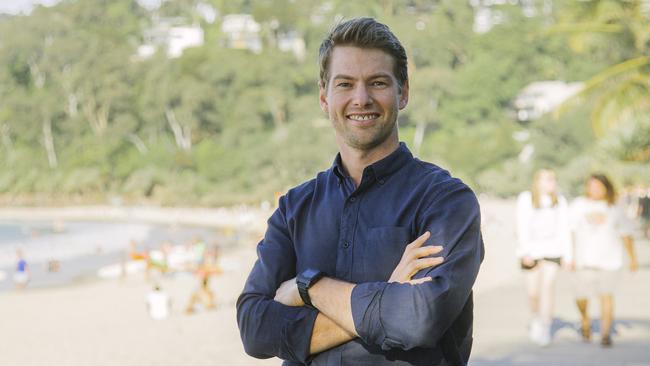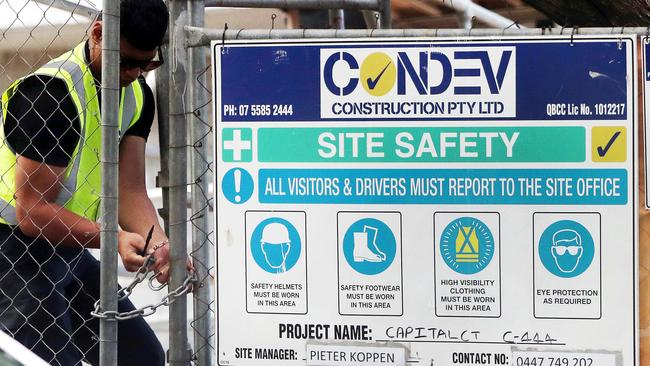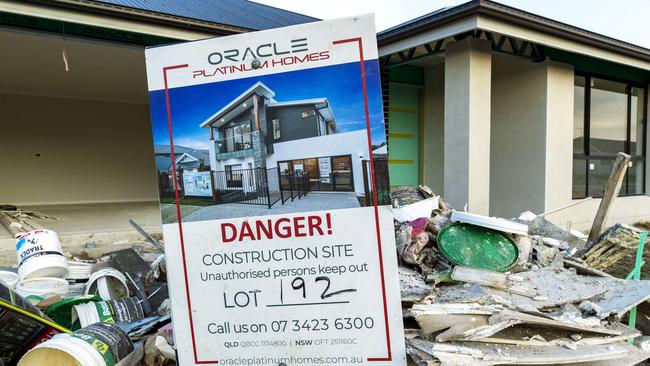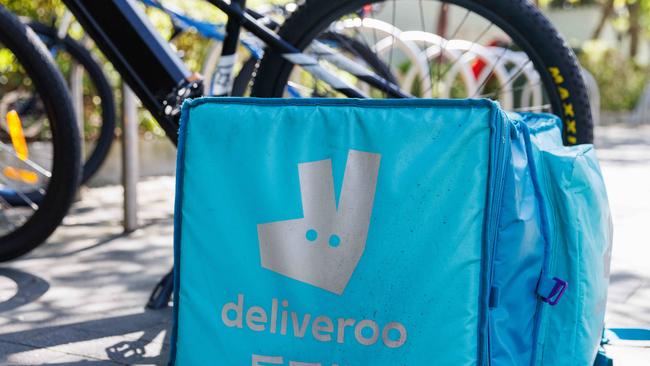Business failures spike as owners hit by ‘sheer exhaustion’
A massive wave of companies across the country went bust last year and experts fear things will only get worse with higher interest rates and inflation. See the list

A wave of more than 5500 Australian companies hit the wall over the past year as many business owners succumbed to “sheer exhaustion.”
The number of companies going into administration or liquidation topped 5560, according to Australian Securities and Investments Commission data.
NSW accounted for roughly 40 per cent with 2177 companies going bust over the past 12 months. Victoria had 1236 insolvencies, followed by Queensland with 970, 432 in West Australia and 225 in South Australia.
Revive Financial director Jarvis Archer said the Australian Taxation Office’s return to recovering tax debts after a two-year hiatus drove a lot of the increase in insolvencies.
“Director warning letters and director penalty notices triggered company directors to deal with their hefty tax debts that accrued during the pandemic,” said Mr Archer.
“What we’re seeing from struggling business owners at the moment is their sheer exhaustion. Often they’ve battled through the last two difficult years just to end up in trading conditions even more hostile than the ones they’ve survived.”
Mr Archer said that as well as the ATO, landlords had become less patient with businesses trying to recover from pandemic lockdowns and other government restrictions.
“A number of local businesses in my local Sunshine Coast area have had locks changed on them, or have closed the doors and walked away,” he said.
WCT Advisory managing partner Andrew Weatherley said the greatest number of insolvency appointments were within the construction industry, followed by accommodation and food services, retail and professional services.

Mr Weatherley said the collapse of several cryptocurrency platforms also had caught a significant number of people by surprise.
“The value of crypto currencies themselves have been falling for several months and are volatile in general,” Mr Weatherley said.
“I think part of the problem seems to be how those entities have been operated and the steamroll effect on confidence in the industry.”
Mr Weatherley said he expected a steady increase in insolvency appointments in 2023 due to higher interest rates, inflation and energy prices. In addition. supply chain issues, staff shortages and wage growth also will impact.
Mr Archer predicted more pain for the troubled construction sector in the coming year. Construction-related companies still represent one in four company insolvencies, compared to one in five pre-pandemic.
“There’s still a lot of stress in this space which is expected to crystallise in increased insolvencies in early 2023,” he said.
“The current state of the construction industry has been characterised by some as a house of cards. The two key factors that are expected to play havoc for the industry in coming months are cashflow and licensing.”
While builders had started to pass on the price increases to clients, delays were still drawing out build times, and labour pricing is through the roof.
“Consequently, there’s still very little margin in projects for builders who are calling this the profitless boom,” Mr Archer said.
Major company collapses in 2022
Condev
Gold Coast building giant Condev collapsed in March owing more than $30m.
The firm, founded in 2002 by Steve and Tracy Marais, closed its doors after talks with developers about a $25m cash boost broke down and the directors considered liquidation was the only option for the company.
Condev, which helped build much of the 2018 Commonwealth Games infrastructure, had 18 projects under construction in southeast Queensland, with 14 on the Gold Coast.

Oracle Homes
Almost 300 subbies and suppliers were left about $14m out of pocket following the collapse of Oracle Homes in August.
The failure of the firm also left 300 homes unfinished across Queensland and NSW and millions owed to an army of subcontractors including plumbers, carpenters and bricklayers.
The Underwood-based company – which traded under a number of names including Oracle Platinum Homes and Oracle Hunter Homes – made headlines earlier in the year when it sought tens of thousands of extra dollars from clients to complete their homes amid the deepening financial crisis in the construction sector.

Trigonx
TrigonX, a key sponsor of the Gold Coast Titans, owes creditors more than $73m it was revealed after the cryptocurrency platform appointed administrators in December.
Trigon, which was the latest Queensland crypto trading firm to hit the wall following the collapse of global giant FTX, collapsed amid the growing chaos in the market for bitcoin and other virtual currencies. It trades as TrigonX.
According to documents lodged with ASIC by administrators William Robson and William Cotter, King River Digital Assets is owed $31m, Pacifika Consortium $26m and ADG Digital $16m.
Brazilian Beauty stores

Brazilian Beauty founder Francesca Webster put two of her companies into administration owing creditors more than $4m.
Documents lodged with ASIC by the administrators show Brazilian Beauty (Australia) and Brazilian Beauty Stores combined owe creditors more than $4m including $1.2m to the Australian Taxation Office, $247,000 to the Queensland Rural and Industry Development Authority and Office of State Revenue $128,000.
The administration appointment comes two years after all the franchisees of the 18-year-old firm left to start their own brand after protracted negotiations in late 2020.
A company controlled by Ms Webster sold nine clinics to her daughter for zero dollars.
Lanskey Constructions
Administrators were appointed to Melbourne Cup winner Paul Lanskey’s construction business owing subbies and other creditors more than $11m.
A report lodged by liquidators FTI Consulting with the Australian Securities and Investments Commission (ASIC) Tuesday reveals Lanskey Constructions Qld Pty Ltd’s 282 unsecured creditors including the Australian Taxation Office, suppliers and subcontractors are owed $11.2m.
Lanskey, founded in 1986 by Melbourne Cup winner Paul Lanskey and Ross Williams, is involved in large commercial projects across Australasia with offices in Brisbane, Sydney, Melbourne, Perth and Auckland.

Probuild
Probuild, one of the country’s largest construction companies, called in administrators in late February after its South African parent said it would stop financially supporting the group.
Probuild, which employed thousands of workers around the country on major construction projects in Brisbane, Sydney and Melbourne, including the global headquarters of pharmaceuticals giant CSL.
Revelations subcontractors owed millions were “left whistling in the wind” because of lack of payment protections led to former Master Builders Australia chief executive John Murray, who conducted a Federal Government inquiry four years ago into insolvency in the sector, to say more needed to be done.
Three of Australia’s largest banks as well as global insurance giants were also caught up in the collapse.
According to documents sent to creditors, ANZ and the Commonwealth Bank were significant actual or contingent creditors of parts of the Probuild empire. They also identified the NAB as a creditor of certain group entities.
Probuild’s parent company said in hindsight it would have pulled the pin earlier on the failed construction firm that went into administration owing $14m to workers and more to creditors.
South African parent company Wilson Bayly Holmes-Ovcon said the Australian business was “out of kilter” with the rest of the company, contributing around 60 per cent of WBHO’s revenue since 2017, but only minimally to the company’s profit.Over the four-year period the Australian arm had $223m in material losses mainly from the 443 Queen St apartment tower in Brisbane and the Western Road Upgrade Project in Melbourne. Losses in the current period in Australia were about $91m, it said at the time.
Deliveroo
In November Deliveroo Australia sacked 150 staff and kicked almost 12,000 restaurants, and 14,500 riders off its platform after the British parent company pulled funding.
Deliveroo said the Australian operations were not profitable and could not continue without substantial financial investment to support the delivery platform.
Deliveroo Australia CEO Ed McManus told staff about the move to close the business late on Wednesday, with KordaMentha administrators appointed to manage the closure.
KordaMentha partners Craig Shepard, Andrew Knight and Michael Korda were appointed Deliveroo Australia’s voluntary administrators.
Mr Korda said Deliveroo was unable to achieve sufficient market share.

Clough
West Australian contractor Clough collapsed in December after a takeover by Italy’s Webuild fell through less than four weeks after a deal was initially struck.
The decision sparked a fresh crisis for the federal government’s Snowy Hydro 2.0 expansion given Clough and Webuild were in a joint venture to build the energy project, and Clough owed its joint venture partner about $88m at the end of June, from a previously undisclosed $167m loan dating back to the 2021 financial year.
Italy’s Webuild stepped in on November 8 to rescue the company in a deal that would have saved one of Australia’s oldest engineering companies from falling into administration. But after that fell through, Clough’s South African parent, Murray & Roberts, told shareholders Clough’s directors had called in Deloitte Australia as voluntary administrators.
Accounts show Clough borrowed more than $167m from Webuild as its financial woes on the Snowy 2.0 contract deepened, with the company slumping to a $375.3m loss and a $304m working capital deficit for the 12 months to June 30.
Webuild reached an agreement on December 14 with Clough administrators for the acquisition of a set of assets including Clough’s Snowy 2.0 and Inland Rail projects.
Elderton Homes
Elderton Homes told customers in December that the NSW-based builder had gone into administration, blaming natural disaster and economic conditions following the pandemic.
“This has been a difficult decision and a result of several factors, not limited to but including bushfires, floods, a global health pandemic and economic conditions,” the company said.
“Furthermore, the Construction Industry has also been subject to record levels of rainfall, substantial price increases on building materials, supply chain challenges and labour shortages.
“Elderton Homes is proud to have built thousands of homes for customers around Greater Sydney, Central Coast, and Illawarra and have assisted our clients build their first home, investment properties, and dream homes.
Snowdon Developments
Victorian construction firm Snowdon Developments Pty Ltd went into voluntary administration in July owing almost $18m to creditors. Parts of the building were purchased by another Victorian construction company, Mimosa Homes.
Brosa
Furniture brand Brosa went into administration in December after strong growth experienced through the early years of Covid-19 was unable to be repeated as lockdowns ended.
“We are pleased to be able to offer a lifeline to Brosa customers, to be able to save the Brosa brand, and to relaunch Brosa.com.au very shortly,” Kogan said last month.
Founded in 2014, Brosa revenue for 2022 was $75m, which was largely generated online, and the Brosa customer base consists of almost 500,000 subscribers.




To join the conversation, please log in. Don't have an account? Register
Join the conversation, you are commenting as Logout